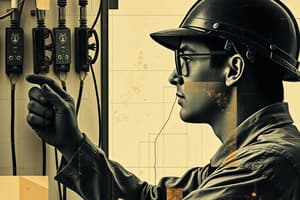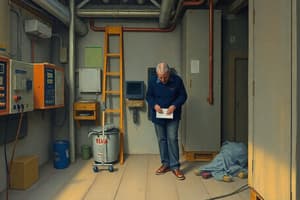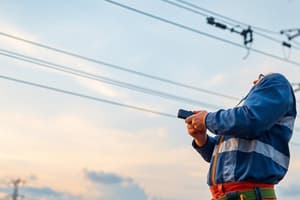Podcast
Questions and Answers
What type of energy does a DC generator convert into electrical energy?
What type of energy does a DC generator convert into electrical energy?
- Mechanical energy (correct)
- Chemical energy
- Thermal energy
- Sound energy
Which type of generator has largely replaced DC generators in most applications?
Which type of generator has largely replaced DC generators in most applications?
- Solar generators
- Hydroelectric generators
- Wind generators
- Alternating current (AC) generators (correct)
In a DC generator, what creates a rotating magnetic field?
In a DC generator, what creates a rotating magnetic field?
- Copper wire
- Aluminum coil
- Steel core
- Permanent magnet or a magnetically excited rotator (correct)
What does the rotator cut across in a DC generator to generate voltage?
What does the rotator cut across in a DC generator to generate voltage?
Where are DC generators still commonly used today?
Where are DC generators still commonly used today?
What does a DC motor convert electrical energy into?
What does a DC motor convert electrical energy into?
What is the most common type of DC motor?
What is the most common type of DC motor?
What principle is the operation of a DC motor based on?
What principle is the operation of a DC motor based on?
What is the purpose of transmission in the electricity grid?
What is the purpose of transmission in the electricity grid?
What is the main focus of ITI Electricians' education and training?
What is the main focus of ITI Electricians' education and training?
What happens to electricity during distribution?
What happens to electricity during distribution?
Which role do ITI graduates play in the field of electricity and power engineering?
Which role do ITI graduates play in the field of electricity and power engineering?
Flashcards are hidden until you start studying
Study Notes
Electrician in ITI: A Focus on Electrical Machines, DC Generator, and DC Motor
The Institute of Technical Education (ITI) is an important bridge between education and practical skills acquisition, preparing a new generation of electricians to master the complex world of electrical systems. In this article, we'll examine some key concepts and applications within the realm of electrical machines, particularly delving into the inner workings of DC generators and DC motors, as well as transmission, distribution, and generation.
DC Generator
A DC generator, or direct current generator, is a machine that converts mechanical energy into electrical energy in the form of direct current (DC). Historically, it was one of the first forms of electric generators and has been widely replaced by alternating current (AC) generators in most applications. However, DC generators still play a role in specific applications, such as in telecommunications, railways, and some industrial applications.
The DC generator has a permanent magnet or a magnetically excited rotator, which creates a rotating magnetic field. As the rotator rotates, it cuts across the coils of the armature, generating a voltage in each coil, which is then summed to create the DC output voltage.
DC Motor
A DC motor is an electric motor that converts direct current electrical energy into mechanical energy. The most common type of DC motor is the series DC motor, where the armature and the field are connected in series to the power source.
The operation of a DC motor is based on the interaction between the magnetic fields of the rotator and the armature. When current flows through the armature coils, they create a magnetic field that interacts with the rotator's magnetic field, causing the rotator to rotate.
Transmission, Distribution, and Generation
Electricity is not generated and consumed in the same location. Electricity must be transmitted to where it is needed, which involves electrical power engineering principles such as AC versus DC transmission, transformers, and overhead transmission lines.
Transmission is the movement of electricity from power plants to substations, where it is then stepped up to high voltages for efficient transmission over long distances.
Distribution is the movement of electricity from substations to consumers. The voltage is stepped down to levels suitable for household usage.
Generation is the production of electrical energy from power sources such as coal, gas, nuclear, solar, and wind, to name a few. Electricity is then fed into the grid to be transmitted and distributed to consumers.
The Electrician's Role in ITI
Electricians in ITI develop a strong understanding of electrical machines, DC generators, and DC motors, as well as the broader principles of power transmission, distribution, and generation. With this knowledge, they are able to:
- Install, maintain, and repair electrical machinery and equipment.
- Diagnose and troubleshoot electrical problems.
- Calculate and oversee electrical installations.
- Ensure compliance with safety standards and regulations.
As the demand for skilled electricians continues to grow, ITI plays a vital role in providing the necessary education and practical training for electrical technicians. By focusing on the key concepts of electrical machines, DC generators, and DC motors, ITI graduates are well-equipped to excel in the field of electricity and power engineering.
Studying That Suits You
Use AI to generate personalized quizzes and flashcards to suit your learning preferences.




